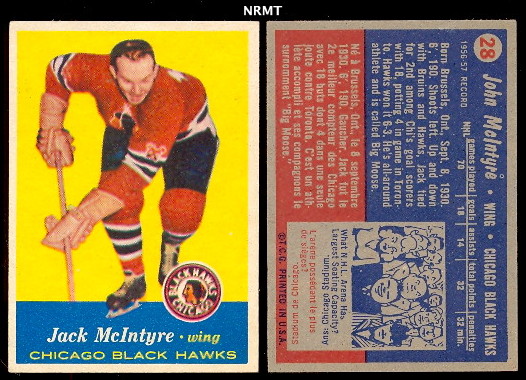LW/RW/D - Jack McIntyre

* Stanley Cup Finalist (1953)
* 2x Top-20 in Goals
* 15+ Goals (1955, 1957, 1958, 1959)
* 5th in Playoff Goals (1953)
* 47th highest scorer over the span of his career (http://www.hockey-reference.com/pla...val=&c4stat=&c4comp=gt&c4val=&order_by=points)

* Stanley Cup Finalist (1953)
* 2x Top-20 in Goals
* 15+ Goals (1955, 1957, 1958, 1959)
* 5th in Playoff Goals (1953)
* 47th highest scorer over the span of his career (http://www.hockey-reference.com/pla...val=&c4stat=&c4comp=gt&c4val=&order_by=points)
McIntyre is listed as a defender on many sites, but as seventieslord has pointed out before, this is simply untrue. He was a winger (mainly leftwinger) first who could play defense if the team needed him to.
Players: The Ultimate A-Z Guide of Everyone Who has Ever Played in the NHL said:Right up until his last he had a passion for the game that inspired his friends to call him "Smilin' Jack".
Heroes: Stars of Hockey's Golden Era said:A defensive minded left winger..
Legends of Hockey said:Jack McIntyre was a fine offensive defenceman (wrong) who fell one game short of 500 in a solid career. His strength was moving up ice with the puck and working the power play, which he did to good effect with three different teams in 1950s.
...the young defender (wrong) scored 12 goals in 51 games as a rookie with the Boston Bruins. The next year, his solid work helped the Bruins reach the Stanley Cup finals. McIntyre scored a key goal and checked tenaciously when the team upset Detroit in the semi-finals.
After starting the 1953-54 season in the minors, McIntyre was traded to the Chicago Black Hawks for cash. He played a key offensive role for the struggling club and scored a career-high 18 goals in 1956-57. After a trade brought him to the Detroit Red Wings, McIntyre played his last three NHL seasons there before returning to the minors





 There goes my Day 2 or 3 guy! Hedberg and I almost picked him last draft.
There goes my Day 2 or 3 guy! Hedberg and I almost picked him last draft.




 From the time teams began dressing two or more pairings of defensemen to the lockout, a period of about 80 years, just three defensemen remained unselected who had been top-3 on a cup winner. Lorimer was one of them, and the only one to do it twice, and the only one to be a #2 on a cup winner.
From the time teams began dressing two or more pairings of defensemen to the lockout, a period of about 80 years, just three defensemen remained unselected who had been top-3 on a cup winner. Lorimer was one of them, and the only one to do it twice, and the only one to be a #2 on a cup winner. 




